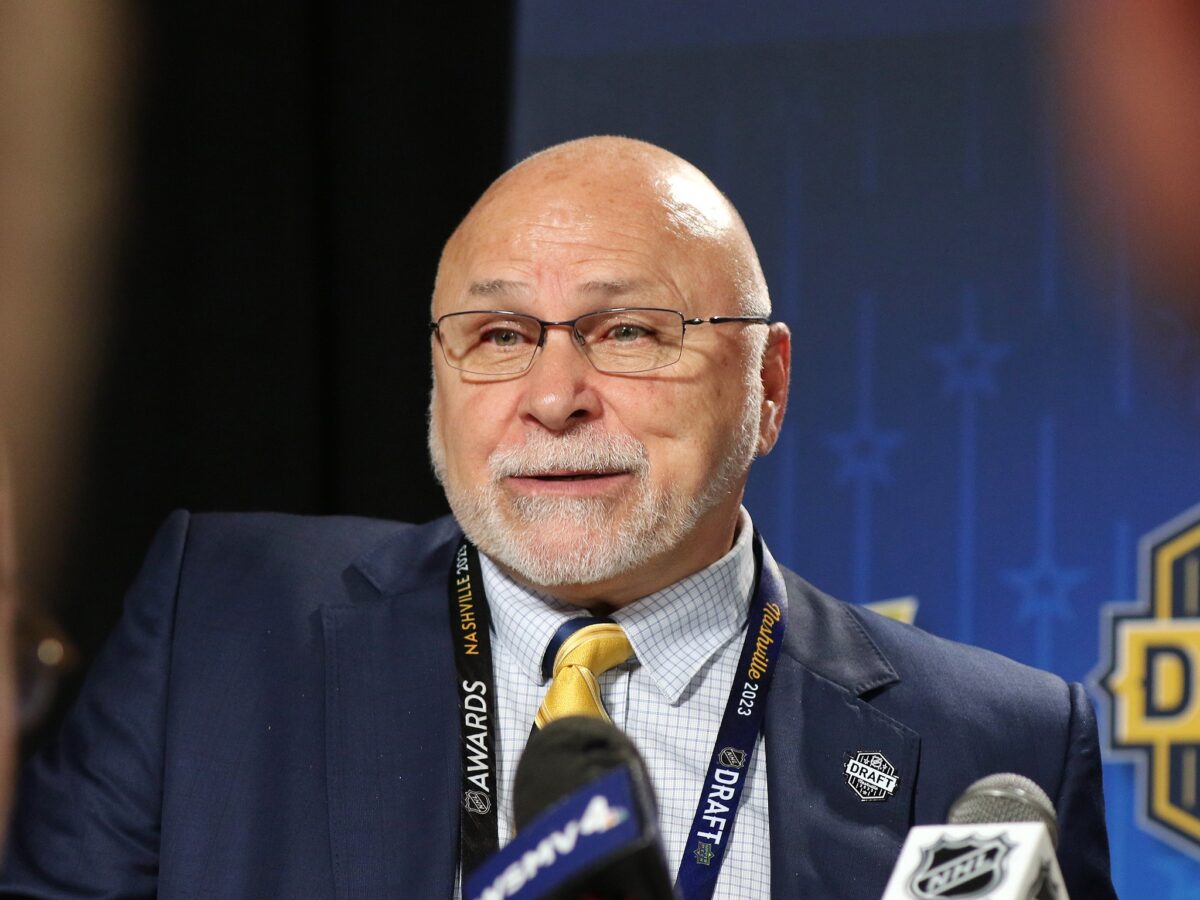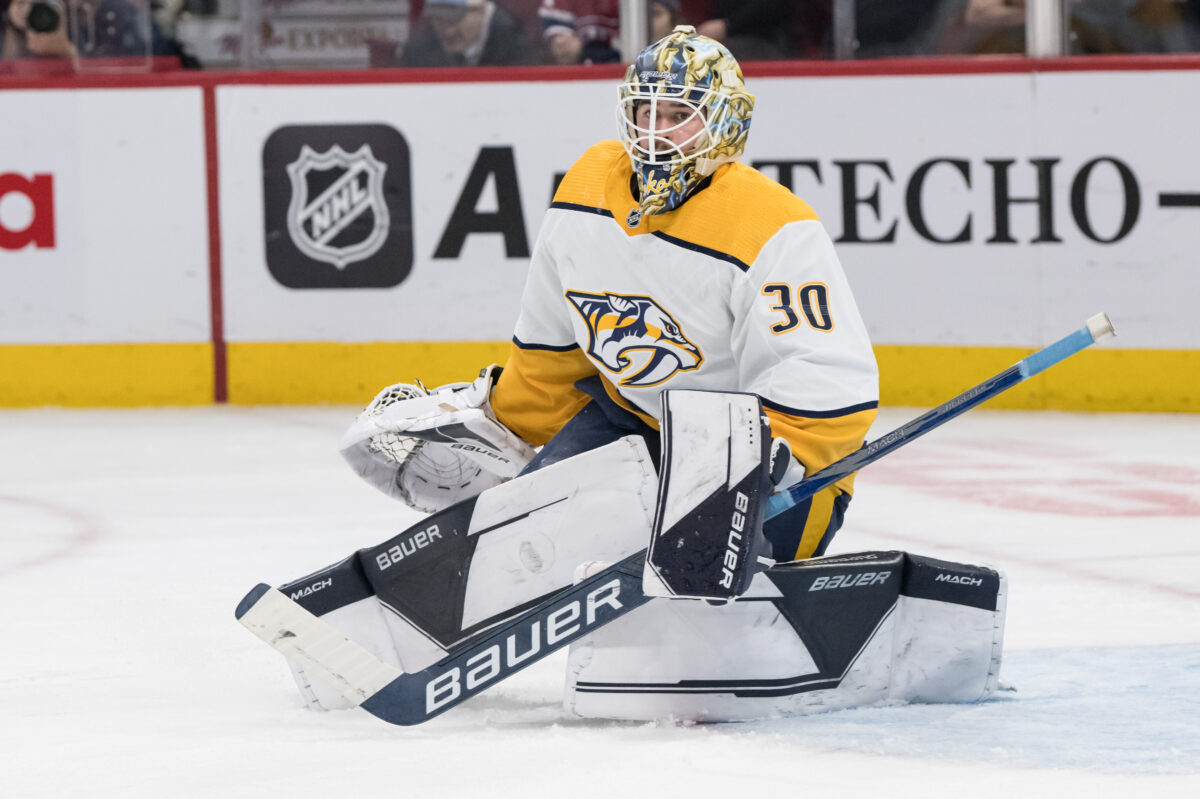The Nashville Predators are one of the hottest teams in the NHL right now. Even though their franchise-record 18-game point streak was just snapped with a loss to the Arizona Coyotes on Thursday night, they still managed to pull off the greatest run in team history. One of the standout performers during this streak was goaltender Juuse Saros, who, as of just three weeks ago, was part of numerous trade rumors, and it looked like a real possibility that he would be moved. Today, the narrative surrounding the Predators and Saros is entirely different, as they sit squarely in the first wild-card spot in the Western Conference.
Saros’ Stellar Performance
Saros’ play between the pipes is undoubtedly one of the many factors in the team’s success over the last month. During the point streak, he had a 10-0-2 record with a goals-against average of 1.99 and a save percentage of .927.
Due to the team’s recent success, the trade talks surrounding Saros that were so prevalent just three weeks ago seem distant and immaterial now. With the trade deadline passed, discussions about his future will inevitably be pushed to the offseason, setting up a massive decision and a potential pivotal shift in strategy for the Predators this summer.
Trotz’s Deadline Strategy Shift
Before the start of the season, general manager Barry Trotz made it clear that he did not envision trading Saros, emphasizing his crucial role on the team and calling him a “superstar in this league.” Despite this assertion, he opened the door to trading Saros before the deadline and the historic point streak.

His tune changed once the Predators started winning before the deadline, which caused him to become a conservative buyer, bringing in Jason Zucker and Anthony Beauvillier, instead of selling off assets like Saros. Despite the current success, the glowing headlines, and the deadline acquisitions, how will the Predators handle their goalie situation this offseason?
Emergence of Askarov
The Preds have long been characterized by their inconsistent play, and this season’s extraordinary run suggests a potential turning point in the franchise.

While Saros has been a critical contributor to the team’s turnaround, the emergence of Yaroslav Askarov as a consensus top-three goaltending prospect in the NHL will create a unique challenge for Trotz. With the 21-year-old showing he might be ready for the NHL, the Predators will have to decide on the best course of action for their goaltenders. Could Saros be traded to make way for Askarov, or will Nashville find a way to utilize both talents effectively?
Predators’ Goalie Outlook for Next Season
One scenario could see Saros and Askarov as the team’s goaltending tandem next season. This would allow the front office to evaluate Askarov’s NHL readiness while benefiting from Saros’ experience and proven stability between the pipes. If Askarov proves himself capable of handling the skill and speed of the league full-time, they might consider moving Saros at the deadline, allowing Askarov to assume the mantle of a full-time starter.

Conversely, should Askarov not meet expectations, the Predators could offer Saros an extension, presenting the team with a safety net as they assess Askarov’s future with the team and his potential trade value. Either way, this is a win-win for Nashville and an excellent problem to have.
Evaluating Saros’s UFA Status and Future
Saros is set to become an unrestricted free agent (UFA) in 2025 and has the option to sign a contract extension with the Predators starting July 1. Trotz thinks time is on his side regarding this issue, and he doesn’t see that date as a deadline to decide Saros’ or Askarovs future in Nashville. After the trade deadline, he said, “When you have time, you want to use it; I think that gives you a lot of clarity” (from ‘GM Barry Trotz explains why Nashville Predators were buyers at the trade deadline,’ The Tennessean, March 9, 2024).
Related: Predators Acquire Jason Zucker From the Coyotes
Trotz also clarified that he sees the goalie decision as situational and indicated that he is open to either trading Saros this offseason or signing him to an extension: “I can give you a bunch of situations. If something comes along from now until July 1, then maybe that situation will get defined and clear,” (from ‘GM Barry Trotz explains why Nashville Predators were buyers at the trade deadline’ The Tennessean, March 9, 2024).
Making the Big Decisions
Either choice carries significant implications for the team’s future, and management can’t hold off on a decision forever. The debate over Saros and Askarov’s future encapsulates the broader challenges of building a contender in the NHL; each general manager will face challenges such as this one, where their decision could ultimately decide whether a team succeeds or fails. Even as the playoffs loom, the front office must be thinking about the decisions that will need to be made in the offseason to shape the present and future of the franchise.